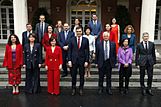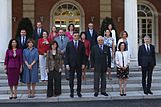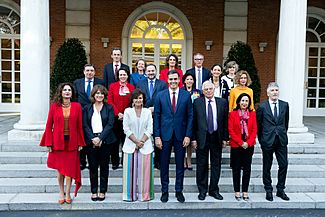First government of Pedro Sánchez facts for kids
Quick facts for kids 1st government of Pedro Sánchez |
|
|---|---|
Government of Spain |
|
| 2018–2020 | |
|
The government in June 2018 (top left), July 2018 (top right) and October 2018 (bottom).
|
|
| Date formed | 7 June 2018 |
| Date dissolved | 13 January 2020 |
| People and organisations | |
| Monarch | Felipe VI |
| Prime Minister | Pedro Sánchez |
| Deputy Prime Minister | Carmen Calvo |
| No. of ministers | 17 |
| Total no. of members | 19 |
| Member party | PSOE |
| Status in legislature | Minority government (2018–2019) Caretaker government (2019–2020) |
| Opposition party | PP |
| Opposition leader | Pablo Casado |
| History | |
| Outgoing election | April 2019 general election November 2019 Spanish general election |
| Legislature term(s) | 12th Cortes Generales 13th Cortes Generales |
| Incoming formation | 2018 vote of no confidence |
| Outgoing formation | 2019–2020 government formation |
| Predecessor | Rajoy II |
| Successor | Sánchez II |
The first government led by Pedro Sánchez was formed in Spain on June 7, 2018. This happened after Sánchez became Prime Minister of Spain on June 2. He was chosen by the Congress of Deputies, which is like Spain's parliament. This change came about because a special vote, called a motion of no confidence, was successful against the previous leader, Mariano Rajoy.
This government took over from the second Rajoy government. It was in charge from June 7, 2018, until January 13, 2020.
The government included members from the PSOE and some independent people. The media often called it the "beautiful government" (gobierno bonito). This was because the new ministers were announced slowly, creating excitement and positive news. It also made history by having the most female ministers in Spain's history, and even in the world at that time. Out of 17 government departments, 11 were led by women, which is about 64.7% of the total.
The government faced a challenge when its plan for the 2019 national budget was not approved by parliament. Because of this, Pedro Sánchez decided to end the parliament's term early and call a snap election, which is a quick election. This made it the shortest Spanish government since Spain became a democracy, lasting only 10 months before a new election was held. The government was officially dismissed on April 29, 2019, after the April 2019 election. However, it continued to act as a temporary government until the next government was officially formed.
Contents
How the Government Started
The government of Pedro Sánchez began after a special vote called a "motion of no confidence." This vote is a way for parliament to show that they no longer support the current prime minister. If enough members vote "yes," the prime minister has to step down.
In this case, the motion was against the prime minister at the time, Mariano Rajoy. For the motion to pass, 176 out of 350 votes were needed.
| Motion of no confidence Pedro Sánchez (PSOE) |
||
| Ballot → | 1 June 2018 | |
|---|---|---|
| Required majority → | 176 out of 350 |
|
|
Yes
• PSOE (84)
• UP–ECP–EM (67) • ERC (9) • PDeCAT (8) • PNV (5) • Compromís (4) • EH Bildu (2) • NCa (1) |
180 / 350
|
|
|
No
|
169 / 350
|
|
|
Abstentions
• CCa (1)
|
1 / 350
|
|
| Absentees |
0 / 350
|
|
| Sources | ||
Important Changes in the Government
During its time, Pedro Sánchez's first government had a few changes in its ministers.
- On June 13, 2018, Màxim Huerta stepped down as Minister of Culture and Sports. He was replaced by José Guirao.
- On September 11, 2018, Carmen Montón resigned as Minister of Health, Consumer Affairs and Social Welfare. She was replaced by María Luisa Carcedo.
After the April 2019 general election, Sánchez's government became a "caretaker government." This means they continued to manage daily tasks but could not make big new decisions. This period lasted until a new government was officially formed. During this time, some ministers left their positions. Their duties were then taken over by other ministers because new replacements could not be appointed.
- On May 21, 2019, Meritxell Batet was chosen as the President of the Congress of Deputies. This job meant she could no longer be Minister of Territorial Policy and Civil Service. Luis Planas, who was the Minister of Agriculture, took over her duties.
- On November 30, 2019, Josep Borrell left his role as Minister of Foreign Affairs. He became a high-ranking official in the European Union. Margarita Robles, the Minister of Defence, then took on his responsibilities.
Who Was in the Government?
The government, also known as the Council of Ministers, included the prime minister, the deputy prime minister, and 17 other ministers. There was also a spokesperson who communicated the government's decisions.
| ← Sánchez I Government → (7 June 2018 – 13 January 2020) |
||||||
| Portfolio | Name | Party | Took office | Left office | Ref. | |
|---|---|---|---|---|---|---|
| Prime Minister | Pedro Sánchez | PSOE | 2 June 2018 | 8 January 2020 | ||
| Deputy Prime Minister Minister of the Presidency, Relations with the Cortes and Equality |
Carmen Calvo | PSOE | 7 June 2018 | 13 January 2020 | ||
| Minister of Foreign Affairs, European Union and Cooperation | Josep Borrell | PSOE | 7 June 2018 | 30 November 2019 | ||
| Minister of Justice | Dolores Delgado | Independent | 7 June 2018 | 13 January 2020 | ||
| Minister of Defence | Margarita Robles | Independent | 7 June 2018 | 13 January 2020 | ||
| Minister of Finance | María Jesús Montero | PSOE | 7 June 2018 | 13 January 2020 | ||
| Minister of the Interior | Fernando Grande-Marlaska | Independent | 7 June 2018 | 13 January 2020 | ||
| Minister of Development | José Luis Ábalos | PSOE | 7 June 2018 | 13 January 2020 | ||
| Minister of Education and Vocational Training Spokesperson of the Government |
Isabel Celaá | PSOE | 7 June 2018 | 13 January 2020 | ||
| Minister of Labour, Migration and Social Security | Magdalena Valerio | PSOE | 7 June 2018 | 13 January 2020 | ||
| Minister of Industry, Trade and Tourism | Reyes Maroto | PSOE | 7 June 2018 | 13 January 2020 | ||
| Minister of Agriculture, Fisheries and Food | Luis Planas | PSOE | 7 June 2018 | 13 January 2020 | ||
| Minister of Territorial Policy and Civil Service | Meritxell Batet | PSC–PSOE | 7 June 2018 | 20 May 2019 | ||
| Minister for the Ecological Transition | Teresa Ribera | PSOE | 7 June 2018 | 13 January 2020 | ||
| Minister of Culture and Sports | Màxim Huerta | Independent | 7 June 2018 | 13 June 2018 | ||
| Minister of Economy and Business | Nadia Calviño | Independent | 7 June 2018 | 13 January 2020 | ||
| Minister of Health, Consumer Affairs and Social Welfare | Carmen Montón | PSOE | 7 June 2018 | 11 September 2018 | ||
| Minister of Science, Innovation and Universities | Pedro Duque | Independent | 7 June 2018 | 13 January 2020 | ||
Changes in June 2018 |
||||||
| Portfolio | Name | Party | Took office | Left office | Ref. | |
| Minister of Culture and Sports | José Guirao | Independent | 14 June 2018 | 13 January 2020 | ||
Changes in September 2018 |
||||||
| Portfolio | Name | Party | Took office | Left office | Ref. | |
| Minister of Health, Consumer Affairs and Social Welfare | María Luisa Carcedo | PSOE | 12 September 2018 | 13 January 2020 | ||
Changes in 2019 |
||||||
| Portfolio | Name | Party | Took office | Left office | Ref. | |
| Minister of Territorial Policy and Civil Service | Luis Planas took on the ordinary discharge of duties from 20 May 2019 to 13 January 2020. | |||||
| Minister of Foreign Affairs, European Union and Cooperation | Margarita Robles took on the ordinary discharge of duties from 30 November 2019 to 13 January 2020. | |||||
Images for kids
See also
 In Spanish: Primer Gobierno Sánchez para niños
In Spanish: Primer Gobierno Sánchez para niños
 | Selma Burke |
 | Pauline Powell Burns |
 | Frederick J. Brown |
 | Robert Blackburn |
























